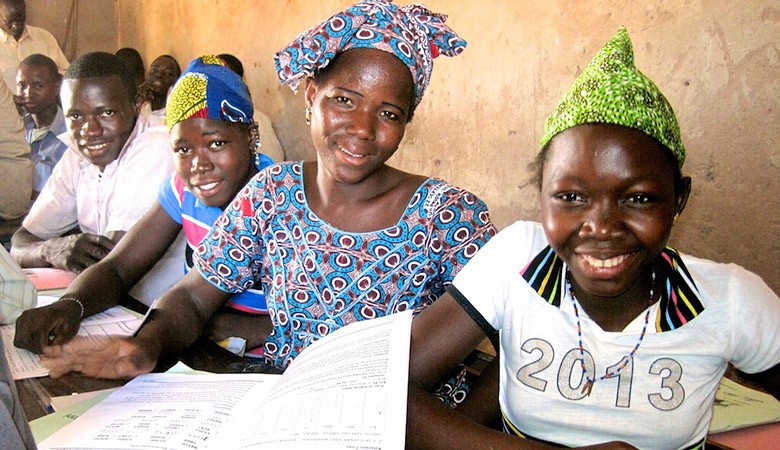Background: About half of the population in Mali is below 18 years, with high levels of youth illiteracy. Inadequate employment opportunities compel the youth to migrate in search of work. This challenge of youth unemployment led to a USAID/EQUIP3 study in 2010, the results of which showed that the youth were willing to engage in productive economic ventures, provided such opportunities were available in their communities of residence. Specifically, the youth indicated their interest in agro-based, artisanal and service training. A skills-based intervention program–the Mali Support to Youth Entrepreneurs, PAJE-Nièta–was subsequently introduced.
Implementation: PAJE-Nièta is a five-year USAID funded project launched in 2010, with support from Mali’s Basic Education and Accelerated Growth divisions. The program targets at least 10,000 beneficiaries. It engages rural youth (educated and non-educated) between 14-25 years in productive economic and civic activities, by providing technical training mostly in agriculture (both crop and pastoral) and mentorship.
Potential program beneficiaries are identified through their community leaders, and guided by technical officers to decide whether to pursue an agricultural, artisanal or civic-based training. Professional/technical training is given for at most 2 years, after which starting capital/kit may be given for the establishment of an enterprise. Beneficiaries who start an enterprise on their own are visited by a technical member of the training team who observes the enterprise to confirm if it is being conducted in the appropriate manner.
An amount of $30 million was earmarked for the duration of the program, which is partnered by the Catholic Relief Services, Association Jeunesse Action (Mali), Swisscross, and Malian sector ministries for education, youth, and employment. PAJE-Nièta is operational in four out of the eight regions in Mali.
Challenges: Access to further funding to support activities of the beneficiaries is a challenge. A savings and internal lending community (SILC) was developed, where contributions are made and presented to members in an agreed order. SILC existed as smaller groups, with membership of about 9,534. Through this, funds are raised to positively support the ventures of the beneficiaries.
The insurgency in Mali halted the activities of PAJE-Nièta in Timbuktu, destroyed existing infrastructure and made the youth vulnerable recruits of jihadists. Though this reduced beneficiaries in that region, eventual participants were trained in conflict-mitigation.
Results: Between 2010 and 2015, 10,951 rural youth received technical training, and 8,077 became self-employed after receiving kits to start micro-enterprises. Though it is reported that 87% of females who completed the training became self-employed, compared with 75% for males, no reason is given for the higher level of self-employment of females compared with males.
An important aspect of the program was the inclusion of unemployed graduates, 303 of whom (including 77 females) were engaged as project implementers, receiving stipends and further training.
Sustainability: PAJE-Nièta trained participants in three batches. At the end of each training, an assessment was conducted to identify challenges encountered during the training program, as well as to understand changes in the labour market. Such information was used to alter the content of training for the next batch of participants. Participants were thus allowed to select and pursue economic ventures of interest to them, guided by prevailing market opportunities. The provision of start-up kits and the presence of technical officers from the implementing agency who periodically monitored the activities of the beneficiaries supported the various enterprises.
Replicability: The provision of employment assistance to the youth should take into consideration the interests of beneficiaries relative to available employment opportunities. Periodic assessment and subsequent revision to training content should be integrated into the program design. Moreover, the provision of start-up capital/kits, and post-program guidance and monitoring of micro-enterprises provides further support to beneficiaries.
References
Center for Educations Innovations. (2015). PAJE-Nieta (French); Mali Out-of-School Youth Project. Retrieved from www.educationinnovations.org: http://www.educationinnovations.org/program/paje-nieta-french-mali-out-school-youth-project-english
EDC. (2016a). Mali Out-of-School Youth (PAJE-Nièta). Retrieved from www.edc.org: https://www.edc.org/mali-out-school-youth-paje-nièta
EDC (2016b). Mali Out of School Youth Executive Summary. Retrieved from www.edc.com: http://idd.edc.org/resources/publications/mali-out-school-youth-paje-nieta-executive-summary
U.S. Mission Mali. (2015, August 21). USAID congratulates the third cohort of the Out-of-School Youth Program (PAJE-Nieta). Retrieved from U.S. Mission Mali: https://ml.usembassy.gov/usaid-congratulates-the-third-cohort-of the-out-of-school-youth-program-paje-nieta/
Project Details
Date: September 8, 2017
